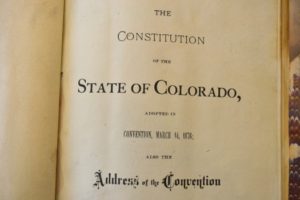by Patti Dahlberg
In case you missed the discussions on House Joint Resolution 18-1021 in the final few days of the 2018 legislative session, the 2019 Legislative Session will begin on Friday, January 4. Of course, this also means that the 2019 Legislative Session will adjourn almost a week earlier than usual – by Friday, May 3.
Traditionally, a legislative session in Colorado commences on the second Wednesday in January — but it can start sooner. The convening date and other important Colorado legislative timelines are specified in the state’s Constitution. The provision determining when the legislative session annually convenes is in section 7 of article V of the state constitution. It requires the General Assembly to meet in regular session at 10 a.m. “no later than the  second Wednesday of January each year.” In 2019, the General Assembly is convening on the first Friday in January. This is necessary because section 1 of article IV of the state constitution requires the newly elected Governor, Lieutenant Governor, Attorney General, Treasurer, and Secretary of State to take office on the second Tuesday of January, which falls on January 8 in 2019. And section 3 of article IV of the state constitution requires the General Assembly to declare the winners of the election for Governor, Lieutenant Governor, and the other three statewide elected officers, or to decide who the winners are if the general election ends in a tie or is contested. To declare the winners, the General Assembly must be in session. So each time all five statewide elected officials are elected, the General Assembly must convene before the second Tuesday of January.
second Wednesday of January each year.” In 2019, the General Assembly is convening on the first Friday in January. This is necessary because section 1 of article IV of the state constitution requires the newly elected Governor, Lieutenant Governor, Attorney General, Treasurer, and Secretary of State to take office on the second Tuesday of January, which falls on January 8 in 2019. And section 3 of article IV of the state constitution requires the General Assembly to declare the winners of the election for Governor, Lieutenant Governor, and the other three statewide elected officers, or to decide who the winners are if the general election ends in a tie or is contested. To declare the winners, the General Assembly must be in session. So each time all five statewide elected officials are elected, the General Assembly must convene before the second Tuesday of January.
Because the convening date for the 2019 legislative session starts on a Friday instead of a Wednesday, House Joint Resolution 18-1021 also adjusted most of the legislative deadline days delineated in the House and Senate Joint Rules. The convening date and any necessary adjustment of deadline days for the 2020 legislative session will be decided by the 72nd General Assembly, most likely by a joint resolution adopted during the 2019 legislative session.
An early convening date means earlier bill request deadlines. This year, each returning legislator must submit three of his or her five bill requests to the Office of Legislative Legal Services (OLLS) no later than Monday, November 26, 2018. Each legislator who is newly elected to the General Assembly must submit three of his or her five bill requests to the OLLS no later than December 10, 2018. Both of these dates are about a week earlier than usual.
Although a January 4th starting date may cut the holiday season a little shorter this year for some of us, it could be worse. The convening date could have been January 1 — like it was a hundred years ago for the 1919 Legislative Session!
Some additional constitutional provisions regarding legislative sessions:
- Each regular legislative session can last no longer than 120 days, including Saturdays and Sundays and any other days the General Assembly may decide to take off (section 7 of article V).
- A regular session can last less than 120 days, which has happened as recently as 2008.
- Section 7 of article V allows the General Assembly to meet outside of a regular session when convened in a special session by the Governor or by written request of two-thirds of the members of each house. During a special session, the General Assembly may consider only the specific subjects listed in the Governor’s call or in the written request. For more information on special sessions, see “What’s so Special about a Special Session?”
- During a legislative session, neither the House nor the Senate may adjourn for more than three days without the consent of the other house (section 15 of article V).
- Before a bill can become law, recorded votes on the bill must be taken on two separate days in each house (section 22 of article V).
- During session, the Governor has 10 days to act on bills that the General Assembly sends to him or her. However, during the last 10 days of session and once the General Assembly adjourns, the Governor has 30 days after adjournment to act on bills sent to him or her (section 11 of article IV).

